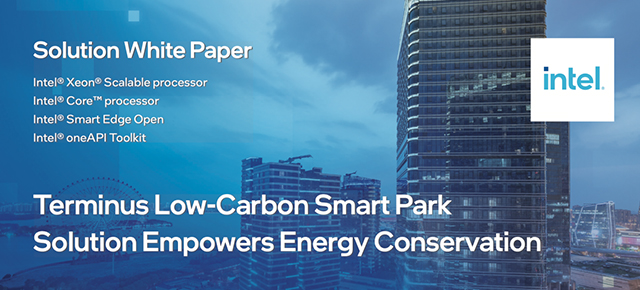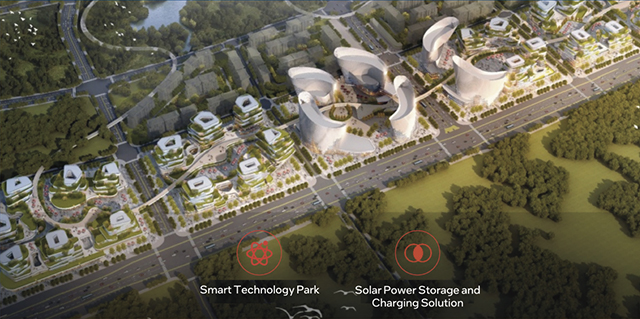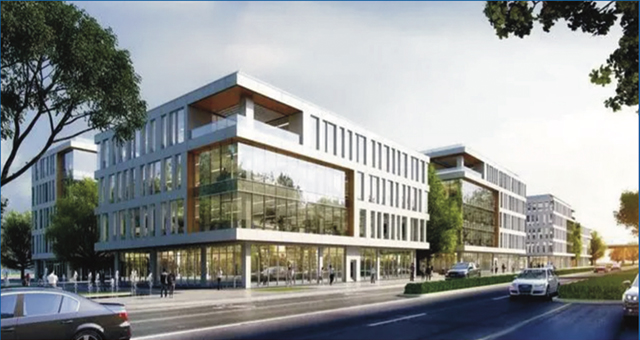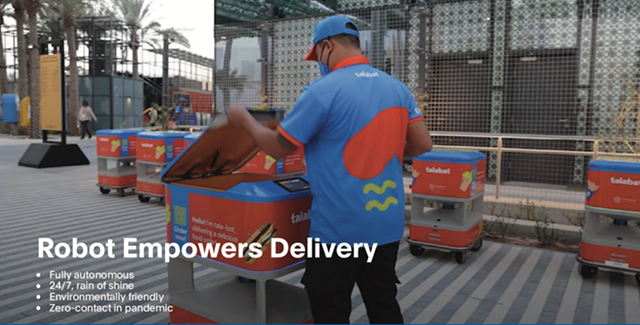Terminus Group and Intel release White Paper on Low-carbon Smart Park Solution to enable urban green and intelligent development
With rich experience in the application of Artificial Intelligence of Things (AIoT) to empower urban and industrial scenarios, Terminus Group joined hand with Intel, released a white paper which launched a low-carbon smart park solution based on Intel® architecture.
Terminus Group low-carbon smart park solution adopts a cloud-edge-end architecture, which is empowered by its city-level TacOS cloud-edge all-in-one product suite, including dual carbon applications such as a building automation system (OriginSYS), a smart solar power system, an urban carbon emission management system, and an energy trading platform, to meet the needs of urban digital intelligence and achieve low-carbon and smart operation for industrial parks and urban development.
TacOS 3.0 establishes a modular five-dimensional urban spatial logic architecture, realizes the large-scale customization of cities based on ecosystem needs, improves urban operational efficiency, reduces costs and risks, and contributes to the sustainable development of smart cities. It integrates a product portfolio of comprehensive platforms and vertical applications based on a unified IoT foundation, digital twin technology, and business intelligence (BI). The operating system provides full-lifecycle carbon footprint monitoring and management from energy production to consumption, and meets the digital intelligence, sustainability, and low-carbon demands of scenarios such as buildings, communities, smart parks, and cities.
At the edge, TacOS 3.0 is optimized for bare-metal machines and virtual machines built on Intel® Xeon® Scalable processors, Intel® Core™ processors, Intel Atom® processors, Intel® discrete GPUs, and Intel® integrated GPUs, providing strong computing power for upper-layer applications. At the cloud, TacOS uses a container platform based on Intel® Smart Edge Open, which integrates AI, media processing, network functions, and security workloads to meet the needs of various applications. At the end, the low-carbon smart park solution includes edge controllers, edge smart gateways, edge servers, IoT terminals, IoT sensors, wireless terminals, and other hardware, along with componentized, modularized, and distributed software components to enable smart park operations.

At present, the Terminus Group low-carbon smart park solution has seen applications in a large number of smart parks, where it has effectively met the digital intelligence, sustainability, and low-carbon demands from end users and delivered positive environmental, social, and economic benefits.
In order to accelerate the adoption of clean energy and reduce energy costs and carbon emissions while supporting distributed sustainable energy generation, electric vehicles, energy aggregation, and other needs of industry transformation, Western (Chongqing) Science City has adopted the Terminus Group solar power storage and charging solution based on Intel® architecture, to met the application needs of solar power for internal use, electric vehicle charging, peak shaving and valley filling, emergency power supply, energy demand management, and more, thereby fully unlocking the value of low-carbon park development.

Western (Chongqing) Science City
With aiming to to lower its high carbon emissions and realize its high untapped commercial potential through low-carbon transformation, the Sino-French Wuhan Ecological Demonstration City has made full use of Terminus Group AIoT technologies in smart park operations, carbon neutrality, smart home, and other scenarios, becoming a demonstration base for advanced green and intelligent industrial campus. Empowered by Intel® processors, the solution supports digital intelligence and other workloads for energy management, integrating park network load storage, building-integrated photovoltaics, and full-scenario digitalization. Through the use of smart solutions and sustainable energy, the park has unlocked its sustainable commercial potential.

Sino-French Wuhan Ecological Demonstration City
Furthermore, as the only Chinese company selected as an Official Primary Partner of Expo 2020 Dubai, Terminus Group worked with partners to ensure the success of the expo, helping Dubai build a model smart city with its proprietary AI City products and concepts. During the six-month event, Terminus Group constructed an IoT platform based on TacOS, deployed over 150 robots based on Intel® architecture, and provided visitors with intelligent services such as guided tours, meal delivery, distribution of promotional materials, and group dance performances.
In addition, Terminus Group had joined hand with talabat, the region's leading local tech platform and the Official Food Delivery Provider for Expo 2020, overcame the challenge of the last-mile delivery with AIoT-based low-carbon and smart robotics solution in the park, around 600 kg of carbon emissions were reduced during the expo. The continuous operation of a food delivery robot for 1 year would reduce around the same emissions as a forest the size of a tennis court. Through advanced AIoT concepts and technologies, Terminus Group helped Expo 2020 Dubai achieve the intelligent management of various assets and catered to the hightech and human-oriented principles of the organizing committee and realized sustainable and energy-efficient operations.

Terminus Group robots provide food delivery services for Expo 2020 Dubai
Through AIoT and other technologies, Terminus Group, the global smart services and AIoT solutions provider, integrated infrastructure platforms, IoT hardware control capabilities, algorithms, computing power, and spatial digitalization capabilities to develop full-scenario intelligent service platforms that drive the intensive, intelligent, sustainable, and low-carbon development of smart parks.
In the future, Terminus Group and Intel will carry out in-depth collaboration on the construction and operation of low-carbon smart parks, make full use of products from the cloud to the edge to create performant, reliable, scalable low-carbon smart park infrastructure systems, facilitate the construction of modern smart parks that develop harmoniously with society, the economy, and the environment, build an engine to enable the AIoT industry, improve industrial agglomeration capabilities and economic competitiveness, realize the vision of cities digitalizatiion, build new landmarks and standards in the smart city space, and enable a variety of key benefits to human well-beings and urban green and smart industrial development.
